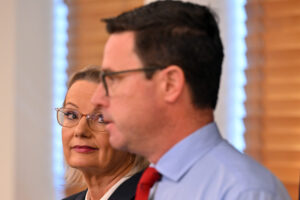First published in the Australian Financial Review – here
It’s bizarre that people blame Tony Abbott’s demise on his inability to communicate. He was a great communicator, and people knew exactly what he stood for. No politician was as relentlessly ‘on message’.
Abbott’s problem wasn’t the clarity of his message; it was the incoherence of his economic and political strategy. He focussed on the wrong priorities for his friends and picked the wrong fights with his enemies. He believed that if he blamed the unions and environment movement loudly enough that voters would overlook the fact that the economy was flagging. The Australian economy clearly needs a plan to fix it, but Tony Abbott only had a plan to fix his opponents.
The Royal Commission into Trade Unions was designed to waste huge amounts of union member’s time and money while delivering a stream of schadenfreude for Abbott’s friends in the business community. Such a taxpayer funded spectator sport was never going to boost productivity. On the contrary it distracted the government from developing policies that might.
Abbott’s obsession with citizens and environment groups using the courts to enforce planning laws is another case in point. Having dubbed the use of legal rights ‘lawfare’, Mr Abbott set out to blame groups like the Bulga Progress Association and the Mackey Conservation Society for Australia’s rising unemployment. It was never going to work.
Only 0.04% per cent of projects seeking approval under the Environmental Protection and Biodiversity Conservation (EPBC) Act have been blocked. Tony Abbott’s determination to make an economic mountain out this an environmental molehill provided clear proof that he was out of his depth.
In the dying months of his prime ministership Abbott clung to the Adani/Carmichael coal mine proposal like a toddler with a teddy bear. His obsession with the project might have given him comfort, but it simultaneously made him look silly and distracted him from more important matters.
In the unlikely event that the Adani/Carmichael mine ever goes ahead, Adani’s own expert, Dr Jerome Fahrer, estimates it will create only 1,400 direct and indirect jobs – less than 15 per cent of the 10,000 jobs Mr Abbott repeatedly claimed. At best, the mine has the capacity to reduce the unemployment rate from 6.22% to 6.21%.
It gets worse. 14 banks have ruled out financing or otherwise publically distanced themselves from the mine, including the Commonwealth Bank, National Australia Bank and Standard Chartered Bank. The Queensland Treasury and every published analysis of the mine’s financials suggests that the mine is a dud that can only proceed if it receives enormous taxpayer subsidies. True to form, Campbell Newman’s former government had offered to fund the 400km long rail line the mine needs, and Tony Abbott was keen for taxpayers to help out via the $5 billion Northern Development bank.
The Adani mine provides a case study in why governments need a good economic strategy more than they need a good communications strategy. In 2014 Tony Abbott was adamant that he needed to cut government spending and end subsidies to the car industry. In the final days of his prime ministership Tony Abbott was adamant that he needed to spend taxpayer’s money to prop up an enormous new coal mine at precisely the time that China and India are cutting their coal imports.
Tony Abbott was clear in explaining why he wanted to scrap car subsidies, and he was clear in explaining why he wanted to subsidise the Adani coal mine. The problem wasn’t his communication skills, it was the fundamental contradictions in the decisions he was trying to communicate.
Malcolm Turnbull is also a clear communicator. Only time will tell if he and his cabinet can make decisions based on a clear economic strategy. Turnbull could make a lot of friends, save a lot of money, and clear up a lot of confusion by ruling out subsidising Tony Abbott’s pet project. Nobody will miss that mouldy teddy bear.
Richard Denniss is Chief Economist at The Australia Institute. @RDNS_TAI
Related documents
Between the Lines Newsletter
The biggest stories and the best analysis from the team at the Australia Institute, delivered to your inbox every fortnight.
You might also like
The election exposed weaknesses in Australian democracy – but the next parliament can fix them
Australia has some very strong democratic institutions – like an independent electoral commission, Saturday voting, full preferential voting and compulsory voting. These ensure that elections are free from corruption; that electorate boundaries are not based on partisan bias; and that most Australians turn out to vote. They are evidence of Australia’s proud history as an
The 2025 federal election is the first where a major party received fewer votes than independents and minor parties.
While the May election result was remarkable for the low vote share going to the major parties, it was just the most recent of a very long trend.
Gender parity closer after federal election but “sufficiently assertive” Liberal women are still outnumbered two to one
Now that the dust has settled on the 2025 federal election, what does it mean for the representation of women in Australian parliaments? In short, there has been a significant improvement at the national level. When we last wrote on this topic, the Australian Senate was majority female but only 40% of House of Representatives

